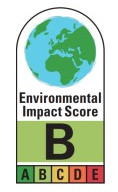IGD has delivered its recommendations to DEFRA for a “consistent approach” to food environment labelling, following two years of research and consultation with government, industry, technical experts, the third sector and academia.
The organisation stated that the recommendations followed an initial call to action from the food industry for an environmental labelling scheme that enables consistency, meets environmental ambitions and cuts through the confusion of multiple eco-labels available.
IGD noted that as a non-lobbying charity, working with the breadth of the food and consumer goods industry and undertaking science-led social impact research, it was well placed to deliver this complex project.
 IGD’s recommendations for an environmental label are said to be wide-ranging and consider a product’s water, land and climate impacts in one easy-to-read, colour-banded score.
IGD’s recommendations for an environmental label are said to be wide-ranging and consider a product’s water, land and climate impacts in one easy-to-read, colour-banded score.
The government acknowledged the need to help shoppers and businesses make more sustainable choices in 2022 when it announced it would mandate a methodology to be used by ‘Any label producer or manufacturer who wants to make environmental claims about their products.’
Sarah Bradbury, CEO of IGD, commented: “More than two years ago, we convened a steering group of 15 members from industry and other stakeholders to build a consistent, collaborative set of recommendations on environmental labelling. We also convened a wider consult group of more than 90 organisations across various sectors and worked with expert technical and consumer research consultancies to shape our work.
“Today, I am delighted to see nearly two years of rigorous research, engagement, and consultation culminate in the set of recommendations we have delivered to Defra to inform its planned consultation on eco-labelling in 2024. Our industry has repeatedly called for a consistent approach that reduces confusion, costs and improves overall efficiency and I believe our recommendations are an important moment in delivering on this call.
“But this is also about much more than what industry wants. Our consumer research shows there is strong support amongst consumers for an environmental label on food and drink products; eight in 10 (81%) think it is a good idea and seven in 10 (69%) believe it will help them make more environmentally friendly choices.
“Our recommendations are that any eco-label for food used in the UK should be inclusive for shoppers, scalable for businesses, pragmatic and affordable, resulting in significant positive change that both reduces environmental impacts and costs for industry.”
IGD adopted a science-led approach to inform the work delivered to DEFRA, which also includes suggestions on consistent data, method and governance. Longer term, the organisation’s recommendations are also expected to enable the food industry to reduce the environmental impact of supply chains and help inform decisions around sourcing.
Bradbury concluded: “Convening our industry in the way we have to deliver these recommendations is a big step forward towards a consistent approach for environment labelling for the UK food industry, indicating the extent to which our industry has an appetite to collaborate, engage and drive positive change on this topic.”



